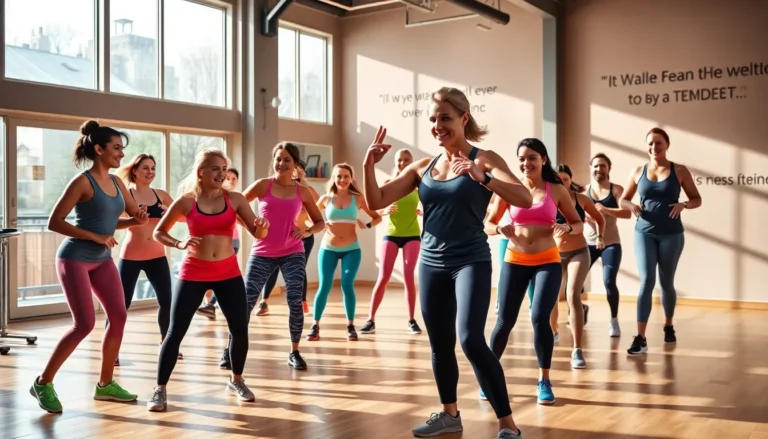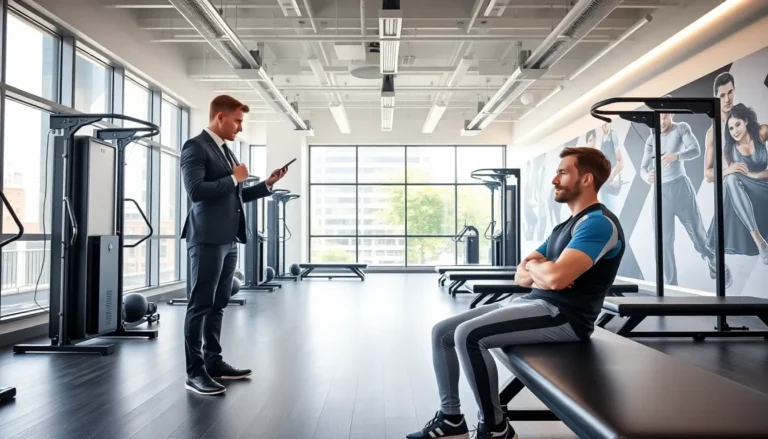In a world where couch potatoes reign supreme and gym memberships are often used as fancy bookmarks, fitness has become the ultimate quest for many. It’s not just about fitting into those skinny jeans; it’s about feeling like a superhero in your own skin. With the right mindset and a sprinkle of humor, anyone can transform into their best self—without sacrificing pizza night, of course.
Fitness isn’t just a fad; it’s a lifestyle that promises to boost energy, improve mood, and maybe even make you the envy of your friends. Whether you’re a seasoned gym rat or someone who thinks “burpees” is a type of sandwich, there’s a path for everyone. So, grab your sneakers and let’s dive into the fun, sweat, and occasional awkward moments that come with embracing a healthier lifestyle.
Table of Contents
ToggleUnderstanding Fitness
Fitness encompasses a holistic approach to health, integrating physical, mental, and social well-being. Engaging in fitness routines enhances overall quality of life and nurtures healthier habits.
The Importance of Fitness in Daily Life
Fitness significantly impacts daily activities and well-being. Improved cardiovascular health leads to increased stamina during everyday tasks. Regular exercise boosts mood and reduces stress, contributing to mental resilience. Incorporating physical activity promotes better sleep, enhancing energy levels. Higher energy levels make it easier to engage in social activities and enjoy time with others. Maintaining fitness influences self-esteem and confidence, creating a positive feedback loop in personal interactions.
Different Types of Fitness
Fitness comprises various categories, each serving unique purposes. Aerobic fitness, including activities like running and cycling, focuses on endurance and heart health. Strength training enhances muscle mass and bone density through resistance exercises such as weightlifting. Flexibility incorporates stretching practices like yoga, improving range of motion and reducing injury risk. Balance training aids stability, crucial for preventing falls, especially in older adults. Additionally, functional fitness emphasizes movements mimicking daily tasks, boosting overall vitality. Understanding these types fosters better fitness choices tailored to individual needs.
Physical Fitness

Physical fitness contributes significantly to overall health. It encompasses various types of exercise that target different bodily functions.
Cardio Fitness
Cardio fitness focuses on the efficiency of the heart and lungs. Engaging in activities like running, cycling, or swimming enhances cardiovascular health and increases stamina. Regular cardio exercise can reduce the risk of heart disease, improve circulation, and boost mood due to the release of endorphins. Many health experts recommend aiming for at least 150 minutes of moderate-intensity cardio each week to reap these benefits. Individuals can tailor their routines based on personal preferences and fitness levels, ensuring enjoyment and sustainability.
Strength Training
Strength training builds muscle mass and enhances metabolic health. Utilizing weights, resistance bands, or bodyweight exercises strengthens muscles and bones over time. Benefits include increased strength for daily activities, improved body composition, and greater bone density. Fitness professionals suggest incorporating strength training into workout routines at least twice a week, allowing for recovery between sessions. Diverse exercises, like squats, deadlifts, and push-ups, can cater to various fitness levels while promoting overall physical performance.
Mental Fitness
Mental fitness plays a crucial role in overall well-being. It emphasizes the importance of nurturing the mind just as much as the body.
The Role of Mindfulness
Mindfulness practices enhance mental clarity and focus. Techniques such as meditation allow individuals to cultivate self-awareness and reduce stress. Regular practice can contribute to improved mood and emotional regulation. Engaging in mindful activities like yoga can further enhance the connection between body and mind. Individuals often find that mindfulness leads to better coping strategies in challenging situations, contributing to a more positive outlook on life.
Strategies for Mental Resilience
Building mental resilience involves several effective strategies. Developing a growth mindset enables individuals to view challenges as opportunities for learning. Maintaining a supportive social network fosters emotional connections, providing strength during tough times. Practical approaches like journaling cultivate reflection and self-discovery, while physical activity supports mental health through endorphin release. Practicing gratitude helps individuals focus on positive aspects of life, reinforcing an optimistic perspective. These strategies combined create a robust foundation for enhancing mental fitness and navigating life’s ups and downs effectively.
Nutrition and Its Impact on Fitness
Nutrition significantly influences fitness outcomes and overall health. Proper dietary choices can enhance energy levels, support recovery, and improve performance during workouts.
Balanced Diet for Optimal Performance
A balanced diet includes carbohydrates, proteins, and healthy fats. Complex carbohydrates such as whole grains and fruits provide sustained energy for workouts and daily activities. Lean proteins from sources like chicken, fish, or legumes support muscle repair and growth. Incorporating healthy fats from nuts or avocados aids in nutrient absorption and hormone regulation. Hydration plays a crucial role as well; drinking enough water prevents fatigue and enhances exercise efficiency. Following these guidelines fosters a solid foundation for optimal performance in various fitness routines.
Supplements and Their Effectiveness
Supplements can complement a balanced diet when necessary. Protein powders serve as convenient options for those struggling to meet protein needs through food alone. Creatine offers benefits for those engaged in high-intensity training, helping improve strength and muscle mass. Omega-3 fatty acids, found in fish oil, may support heart health and reduce inflammation. While supplements may benefit some, they shouldn’t replace whole foods. Individuals should consult with healthcare professionals to assess personal dietary needs before incorporating supplements into their routines.
Fitness Trends to Watch
New trends consistently reshape the fitness landscape. Staying informed enhances overall health and enjoyment in workouts.
Emerging Workout Styles
Unique workout styles gain popularity. High-intensity interval training (HIIT) attracts individuals seeking efficient, effective workouts. Participants experience maximum benefit in minimum time. Dance-based workouts, like Zumba and barre, combine fitness with fun. These classes foster community and motivation while emphasizing rhythm and movement. Outdoor fitness classes offer fresh air and a connection to nature, drawing enthusiasts interested in scenic environments. Moreover, functional fitness focuses on real-life movements and improving daily activities, appealing to those prioritizing practical benefits.
Technology in Fitness
Innovative technology transforms fitness routines. Wearable devices, such as fitness trackers, provide valuable insights on daily activities and performance. Users can monitor heart rates and calories burned, fostering accountability. Smartphone apps offer guided workouts and nutrition tracking, simplifying fitness management. Virtual reality fitness, an emerging trend, immerses users in engaging workouts that entertain while providing physical benefits. Online platforms provide access to live and on-demand classes, making fitness more accessible than ever. Blockchain technology facilitates secure workout tracking and incentivizes healthy behaviors through cryptocurrency rewards. These technological advancements continuously enhance the fitness experience.
Embracing fitness as a lifestyle choice opens the door to a healthier and more fulfilling life. It’s about finding joy in the journey rather than just focusing on the destination. By integrating physical activity with mental wellness and balanced nutrition, individuals can experience profound improvements in their overall quality of life.
Staying informed about emerging trends and utilizing technology can further enhance fitness experiences. The path to better health is inclusive and adaptable, allowing everyone to find their unique approach. Ultimately, committing to a fitness journey not only transforms the body but also nurtures the mind and spirit, leading to a vibrant and energized existence.








